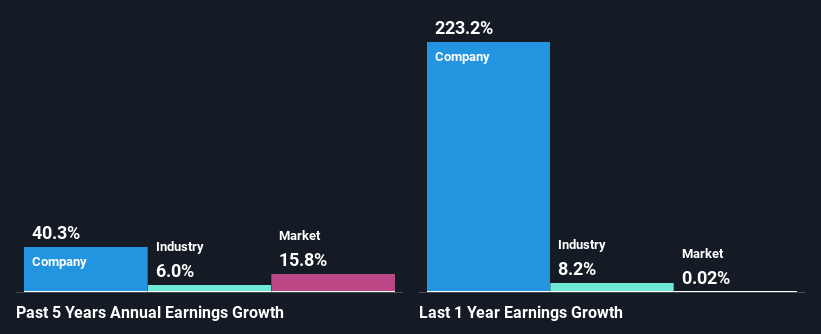Is TPC Consolidated Limited's (ASX:TPC) Latest Stock Performance A Reflection Of Its Financial Health?
TPC Consolidated (ASX:TPC) has had a great run on the share market with its stock up by a significant 66% over the last month. Given the company's impressive performance, we decided to study its financial indicators more closely as a company's financial health over the long-term usually dictates market outcomes. Specifically, we decided to study TPC Consolidated's ROE in this article.
Return on Equity or ROE is a test of how effectively a company is growing its value and managing investors’ money. Simply put, it is used to assess the profitability of a company in relation to its equity capital.
See our latest analysis for TPC Consolidated
How To Calculate Return On Equity?
Return on equity can be calculated by using the formula:
Return on Equity = Net Profit (from continuing operations) ÷ Shareholders' Equity
So, based on the above formula, the ROE for TPC Consolidated is:
52% = AU$17m ÷ AU$32m (Based on the trailing twelve months to June 2023).
The 'return' is the amount earned after tax over the last twelve months. Another way to think of that is that for every A$1 worth of equity, the company was able to earn A$0.52 in profit.
Why Is ROE Important For Earnings Growth?
We have already established that ROE serves as an efficient profit-generating gauge for a company's future earnings. We now need to evaluate how much profit the company reinvests or "retains" for future growth which then gives us an idea about the growth potential of the company. Generally speaking, other things being equal, firms with a high return on equity and profit retention, have a higher growth rate than firms that don’t share these attributes.
A Side By Side comparison of TPC Consolidated's Earnings Growth And 52% ROE
First thing first, we like that TPC Consolidated has an impressive ROE. Second, a comparison with the average ROE reported by the industry of 10.0% also doesn't go unnoticed by us. So, the substantial 40% net income growth seen by TPC Consolidated over the past five years isn't overly surprising.
We then compared TPC Consolidated's net income growth with the industry and we're pleased to see that the company's growth figure is higher when compared with the industry which has a growth rate of 6.0% in the same 5-year period.
The basis for attaching value to a company is, to a great extent, tied to its earnings growth. It’s important for an investor to know whether the market has priced in the company's expected earnings growth (or decline). This then helps them determine if the stock is placed for a bright or bleak future. Is TPC Consolidated fairly valued compared to other companies? These 3 valuation measures might help you decide.
Is TPC Consolidated Efficiently Re-investing Its Profits?
TPC Consolidated's three-year median payout ratio is a pretty moderate 33%, meaning the company retains 67% of its income. So it seems that TPC Consolidated is reinvesting efficiently in a way that it sees impressive growth in its earnings (discussed above) and pays a dividend that's well covered.
Additionally, TPC Consolidated has paid dividends over a period of six years which means that the company is pretty serious about sharing its profits with shareholders.
Summary
Overall, we are quite pleased with TPC Consolidated's performance. Particularly, we like that the company is reinvesting heavily into its business, and at a high rate of return. Unsurprisingly, this has led to an impressive earnings growth. If the company continues to grow its earnings the way it has, that could have a positive impact on its share price given how earnings per share influence long-term share prices. Let's not forget, business risk is also one of the factors that affects the price of the stock. So this is also an important area that investors need to pay attention to before making a decision on any business. Our risks dashboard would have the 2 risks we have identified for TPC Consolidated.
Have feedback on this article? Concerned about the content? Get in touch with us directly. Alternatively, email editorial-team (at) simplywallst.com.
This article by Simply Wall St is general in nature. We provide commentary based on historical data and analyst forecasts only using an unbiased methodology and our articles are not intended to be financial advice. It does not constitute a recommendation to buy or sell any stock, and does not take account of your objectives, or your financial situation. We aim to bring you long-term focused analysis driven by fundamental data. Note that our analysis may not factor in the latest price-sensitive company announcements or qualitative material. Simply Wall St has no position in any stocks mentioned.

